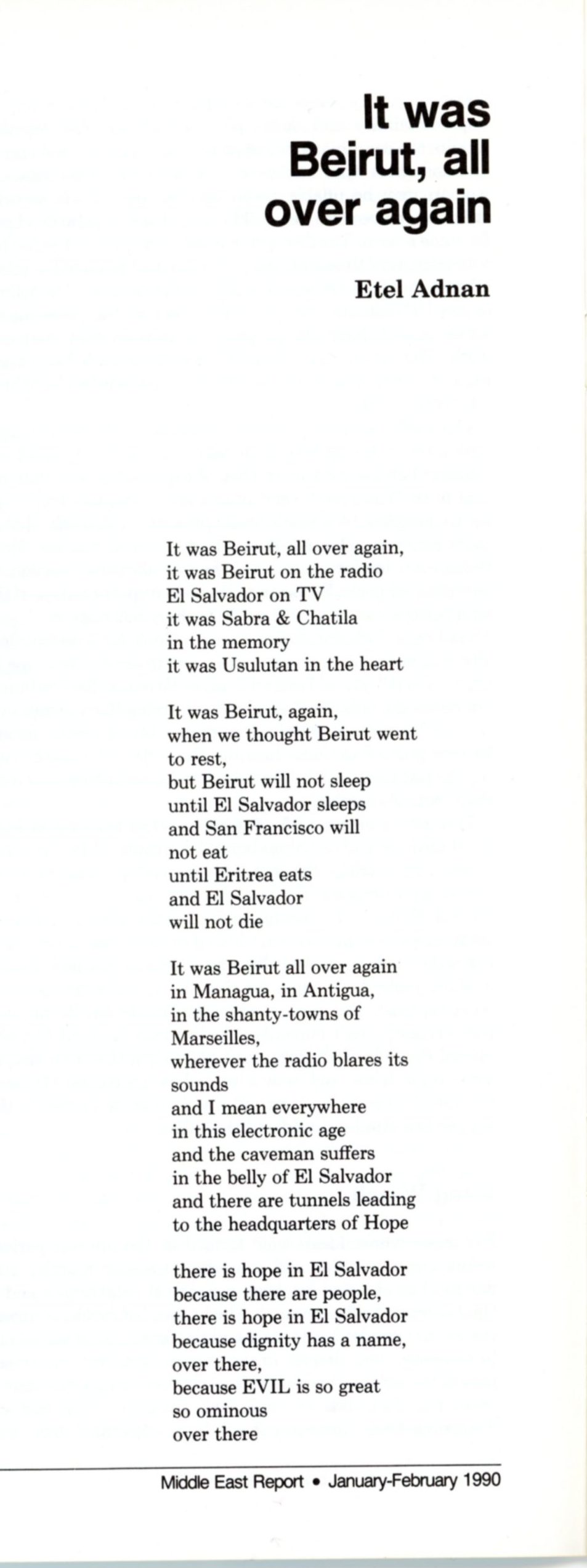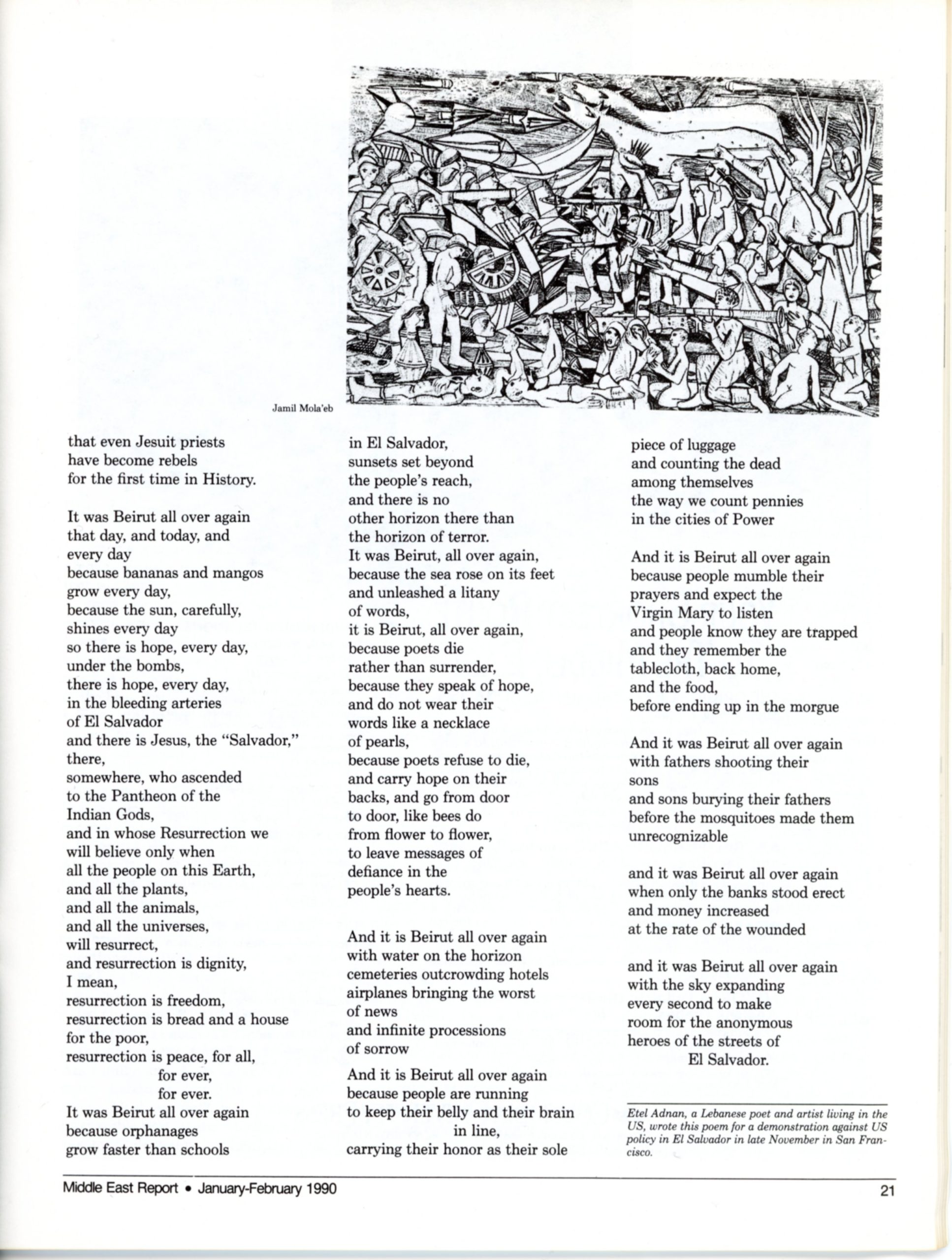
Middle East Report no. 162, January-February 1990. Cover photo by Alfred Yaghobzadeh, design by Kamal Boullata.
Archive is another word for multitude. Archives arrest and curate multiple, always potentially calamitous, futures, pasts and presents. The multiplicity of archives is enacted every time a different person performs the same action or search. Retrieval and research exist only as mediation, as the specific, embodied performance of a modular form. That night the search engine of MERIP’s online archive pointed me to a poem I had never read, but that I now no longer remember not having read: Etel Adnan’s “It Was Beirut, All Over Again.”
Adnan’s poem appeared in a 1990 issue of Middle East Report, one year after the magazine had published sections of “The Arab Apocalypse”—her symphonic, staccato sketch of an epic poem depicting a region and a poet staring, and wearing, each other down. The January/February 1990 issue focused on “Lebanon’s War,” and with good reason—the Taif Accord had been signed four months earlier. Just as the issue (with the subtitle “Any End in Sight?”) was being published, a man in a uniform was still fighting what would become the final chapter of the Lebanese Civil War that lasted from 1975 to 1990, while the Israeli occupation of south Lebanon persisted until 2000. That man was army general, then self-proclaimed prime minister, and now (in 2021) President Michel Aoun. The same issue includes an interview about Aoun and is thick with analysis, interviews, a primer and, of course, Adnan’s poem. It is a conventional issue but for Adnan’s intervention.
While the issue itself is tightly coiled around Lebanon, “It Was Beirut, All Over Again” is surprisingly not about Beirut. Or at least it is not primarily about Beirut. Instead, in Adnan’s poem the city is multiple: not quite a metaphor, but also not quite itself. It is Palestine, it is El Salvador, it is San Francisco, Managua, Antigua, Marseille. The poem captures what it is like to mourn the world, to absorb it and its violence, through Beirut. It paints the twinned singularity and universality of violence; how claustrophobic violence can feel, how expanding it is to understand that your catastrophe—or apocalypse, to borrow Adnan’s rendering—is not exceptional. Instead, at least in the hands of Etel Adnan, the experience of violence transforms Beirut into a sponge, but a sponge that serves as a portal. A fall through Beirut might transport you to anywhere there is a felt understanding of violence without consequence, violence that does not make or break worlds. A portal, of course, is open at both ends. El Salvador on television transported Adnan to Beirut and one of its hearts: Sabra and Shatila.
“It was Beirut, all over again,
it was Beirut on the radio
El Salvador on TV
it was Sabra & Shatila
in the memory
it was Usulutan in the heartIt was Beirut, again,
when we thought Beirut went
to rest, but Beirut will not sleep
until El Salvador sleeps”
At the bottom of the printed poem in MERIP are three italicized lines: “Etel Adnan, a Lebanese poet and artist living in the US, wrote this poem for a demonstration against US policy in El Salvador in late November in San Francisco.” San Francisco in 1990 was the epicenter of the AIDS pandemic and political organizing. Thousands had died in the city; 120,453 had died across the United States. Those who became ill and died in that first decade of AIDS in the United States were met with murderous callousness and neglect by both the public and the government. Too often, they were blamed for their own deaths. In that wounded, angry city Adnan had gathered with others to protest US aid to El Salvador in the wake of a massacre of Jesuit priests and their caretakers by the Atlacatl Battalion of the Salvadorean army—a battalion trained and armed by the United States. Seven years earlier, the Lebanese Forces, a militia supported by the United States, killed, raped and maimed thousands in the Palestinian refugee camp of Sabra and Shatila. The army that facilitated the massacre—the Israeli army—was, and is, the closest ally and beneficiary of the United States in the region, if not the world. Adnan then moves to Usulutan, the site of another massacre by the Atlacatl battalion, one year before the Sabra and Shatila massacre. A painful, lamentable truth threads these different locations, actors and histories: There is no justice and killing is not, after all, always a crime. Instead, killing is the privilege of the powerful.
The Lebanon of 1990 was divided, full of rubble, garbage, fuel and bread lines and people with guns. Thirty years later, Lebanon is divided, full of rubble, garbage, fuel and bread lines and people with guns. Thirty years ago, the erosion of the Lebanese pound, coupled with inflation and an absolute lack of accountability—for both violence and theft—bankrupted many. Now, 30 years later, the erosion of the Lebanese pound, coupled with inflation and an absolute lack of accountability—for both violence and theft—has bankrupted most. In 1990, the people who were responsible for unimaginable violence against people in Lebanon, and crimes against humanity writ large, were on the way to declaring amnesty for themselves, encasing in law what they had won through violence—impunity. In 2021 those who bear responsibility for one of the largest and most destructive non-nuclear explosions in history, the Beirut Port explosion, also used the law to declare themselves immune to accountability. Some of the names of political leaders that children in 1990 had memorized—Berri, Jumblatt, Aoun, Geagea, Gemayel and Hariri—are still memorized today by children, with the addition of one name: Nasrallah. Many of these last names are merely placeholders for generations of men from the same family who have been, and will be, in power. The grandfather, the father, the son. Thirty years ago, racketeering, smuggling and corruption had bankrupted the state. The virus had killed its host. Thirty years later, racketeering, smuggling and corruption have bankrupted the state—and the virus has killed its host, again. In 1990, many parts of the country were starved of electricity and water, while other parts of the country enjoyed these public goods on an intermittent and unpredictable schedule. Thirty years ago, through this apocalypse-turned-routine, Adnan saw a world on fire and was transported to El Salvador via Beirut, and to Beirut via El Salvador. Thirty years later, in this apocalypse-turned-routine, we live in a world on fire, and many spent the summer in Beirut consumed with Palestine, with Tigray, with Syria, with Iraq, with Afghanistan, with a new pandemic, with the fire itself, with the lack of water seemingly anywhere, everywhere.
“And it is Beirut all over again
because people are running
to keep their belly and their brain
in line,
carrying their honor as their sole
piece of luggage
and counting the dead
among themselves
the way we count pennies
in the cities of Power”
Much of Middle East Report’s January/February 1990 issue could have been written today, or perhaps tomorrow. Then, the Lebanese Civil War was coming to a close and those not killed—the exhausted, displaced, impoverished, assaulted, robbed, emigrated and beaten—just wanted it to STOP. The Taif Accord was heralded not with faith or hope, but rather, with a desperation that can only be felt, not understood. Through this desperation, the regime of the civil war was able to reproduce and arm itself with a new set of weapons: the law, the state, the judiciary, the Central Bank. Today, the war on people in and from Lebanon continues, and all these weapons are deployed against them.
“It was Beirut all over again
because orphanages
grow faster than schools
in El Salvador, sunsets set beyond
the people’s reach,
and there is no
other horizon there than
the horizon of terror”
In the year 1990 a poem was published, a war in Beirut was ending, another was continuing in El Salvador and a woman protested and read her poem—threading and absorbing unthinkable, unending violence through the portal of Beirut in San Francisco. That year my apartment in Beirut was marred by bombing campaigns launched by then-general, now-President Michel Aoun. The false ceiling came crashing down. Thirty years later, the repaired ceiling fell again because of an explosion at the port that damaged much of Beirut. It has yet to be repaired. As with the civil war, a regime of impunity demands that everyone forget, or at least accept, that their lives are expendable and not worth the troubles that accountability may bring. The relationship between the act of killing and accountability for that killing is framed as dangerous to civil peace. In El Salvador and in Beirut, in 1990 and in 2021, the families and loved ones of the dead and disappeared become a nuisance with their photos, their protests and their reminder that killing is a crime even when laws and judges and parliaments and presidents recoil from designating murderers as criminals.
“and it was Beirut all over again
when only the banks stood erect
and money increased
at the rate of the wounded
and it was Beirut all over again
with the sky expanding
every second to make
room for the anonymous
heroes of the streets of
El Salvador.”
Almost exactly a year after the port explosion, I stickily sat in that damaged apartment that is my home, opened my computer, performed a search on MERIP’s website and fell into an archive of lamenting, feeling, writing and protesting a world of pain. That August night, reading Adnan in the fluorescence of a battery-powered light, breathing the stale air of a closed room, absorbing the darkness of a city without electricity, the pain of the world all around me, it felt as if 30 years had not passed at all. Instead, the years take shape as a circle, not a line.
There is no past and there is no future in this archival space we call Beirut, itself just another portal to locations and scenes of catastrophe that should be exceptional but are not. Instead of futures and pasts, there is only an overwhelming, starving desire for endings and for beginnings. To read “It Was Beirut, All Over Again” is to experience time, and the world in time, through a felt knowledge: the violence that breaks you and your world does little to break, or remake, the world.
[Maya Mikdashi is assistant professor at Rutgers University, co-founder of Jadaliyya and author of the forthcoming book Sextarianism: Sovereignty, Secularism and the State in Lebanon.]


